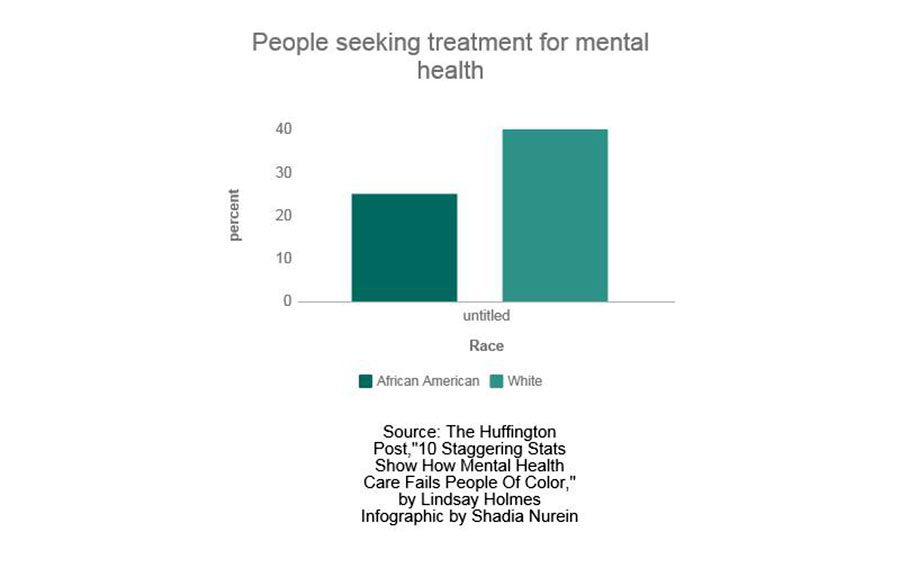We need to talk about the stigma against mental health and students of color
These statistics are of 2016 and they show the difference between white people and African Americans seeking treatment for mental health. These statistics demonstrate that African Americans aren’t encouraged to seek treatment compared to white people.
October 13, 2016
Students of color mental health issues are often overlooked and looked down upon by teachers here at South to the point where our issues seem like they don’t even exist.
“I haven’t seen students who teachers didn’t believe, but what i have seen more of is students who aren’t comfortable talking about their mental health issues” explained Salma Hussein a social worker at South high.
Many students of color don’t speak about mental health because it is something that people associate with being white and are used to hearing that it’s all in their heads when they do speak up about it.“In our cultures people don’t talk about ‘oh i’m feeling depressed’ or ‘i’m feeling anxious’, people think that that’s a white thing” said Hussein
Students of color have a bar that is set higher than their white peers in school. Students are expected to be mentally prepared in the morning and to be apart of class work and group work which can be anxiety provoking. Talking about their health can make them feel like that it is the only thing that describes them. “ I think in the Somali community and the African community if you have a mental health issue it defines you and no one wants to be defined by an illness” explained Hussein.
A sophomore here at South explains how teachers look at students of color who have mental illnesses as just rowdy or disruptive ignoring their mental health.“I would say that it is a very accurate statement to say that teachers don’t notice colored students and their mental health because they just overlook them as troubled kids,” she commented.
Many times when a white student has a panic attack in class and needs to take a break they are often encouraged or told to take as much time as they need and can just walk out of class. When a student of color does something similar they get looked at as a bad kid. “ I get sent to the dean, I get sent to the office” explained Surayah Mcroy-Tyson a South sophomore . Students of color tend to have these consequences when they struggle with mental health.
When people find out that a person of color goes through the same things white people do it’s unexpected and comes as a surprise. “White people they cut themselves because their mom yelled at them but black people we start doing that and it’s wrong and they look at us like why are you cutting yourself I didn’t know black people did that” said Mcroy-Tyson.
Teachers and other people have a preconceived notion that people of color are strong and being weak or vulnerable is out of the question for them. “They don’t go through those things, [black people] were slaves they’re strong!” explained Mcroy-Tyson.
Teachers forget to acknowledge that students of color have the same if not harder times that contribute to their mental health including racism something white students don’t go through. “I have not seen as many white students experience the same things as me” explained the South sophomore.
She continued on to say “racism has added a lot to my mental health especially this year and specifically in one of my classes, there’s just been a lot of issues with race in that class and alongside my mental health issues and my anxiety it’s a really big stresser just going to that class is somewhat of a trigger for me. Just knowing that I have to go to that classroom with that teacher and hear things that don’t relate to my life as a colored person what so ever is really hard”.
If the South sophomore could give advice to anyone dealing with mental health she would say that they are not alone and they are going to get through this. “There’s people here for you and your not alone people care even if it doesn’t feel like it and you’re really strong because you made it this far.”
As a person of color I feel like problems like mental health can seem like mental health isn’t real for us. Having experiences with mental health and being told that it’s a bad attitude problem or that were just disruptive can make it even harder. Especially when teachers don’t believe students problems or fail to recognize the stigma for people of color and mental health. I think it is time for teachers to become more educated on it and stop affiliating mental health with whiteness.






Harold A. Maio • Oct 13, 2016 at 9:48 pm
—-We need to talk about the stigma against mental health and students of color
You mean discrimination. “Stigma” is the term of the victimizer, discrimination is the visceral experience of the victim.
Never let the victimizer persuade you to call his prejudice your stigma.